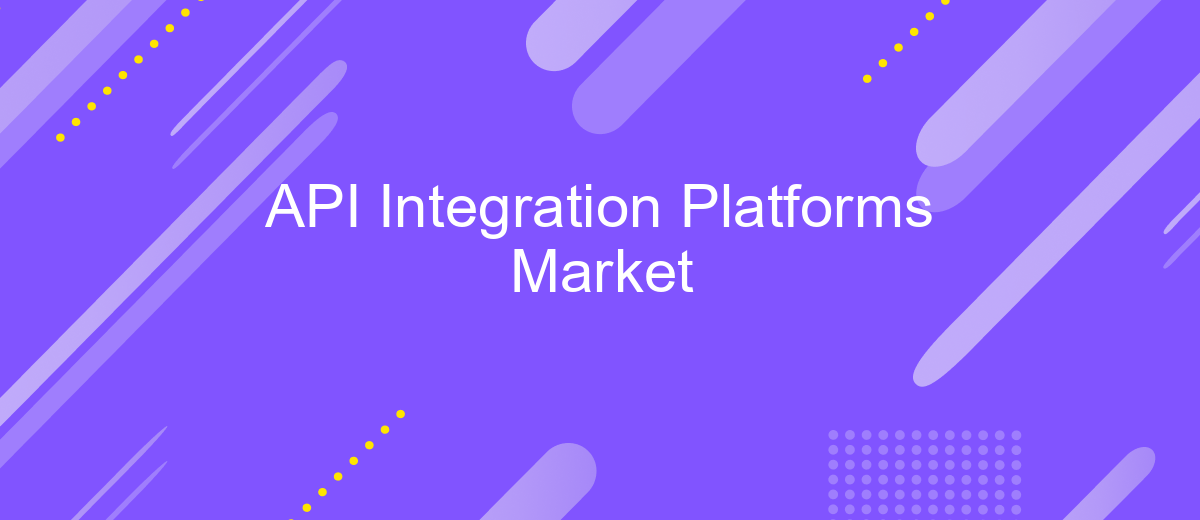API Integration Platforms Market
The API Integration Platforms market is rapidly evolving, driven by the increasing demand for seamless connectivity and interoperability among diverse software applications. As businesses strive to enhance operational efficiency and deliver superior customer experiences, these platforms have become essential tools. They facilitate streamlined data exchange, automate workflows, and enable scalable digital solutions, positioning themselves as pivotal components in the modern technological landscape.
Introduction: Defining API Integration Platforms and Their Significance
API integration platforms have become a cornerstone in the digital ecosystem, enabling seamless connectivity between disparate software applications. These platforms facilitate the exchange of data and functionalities, allowing businesses to enhance operational efficiency and drive innovation. By leveraging API integration, organizations can streamline processes, reduce manual intervention, and ensure real-time data synchronization across various systems.
- Facilitates seamless data exchange between applications
- Enhances operational efficiency and productivity
- Enables real-time data synchronization
- Reduces manual intervention and errors
- Supports scalability and flexibility in IT infrastructure
In today's fast-paced digital landscape, the significance of API integration platforms cannot be overstated. They are pivotal in supporting digital transformation initiatives, allowing businesses to quickly adapt to changing market demands. As companies increasingly rely on cloud-based solutions and microservices architectures, the demand for robust API integration platforms is set to grow, underscoring their vital role in the modern technological framework.
Market Segmentation and Analysis (By Deployment, By Enterprise Size, By Vertical, By Region)

The API Integration Platforms Market is segmented by deployment into cloud-based and on-premises solutions. Cloud-based platforms are gaining traction due to their scalability, flexibility, and cost-effectiveness, appealing to businesses seeking efficient integration solutions. On-premises deployments, while less common, are preferred by organizations with stringent security requirements. In terms of enterprise size, small and medium-sized enterprises (SMEs) are increasingly adopting these platforms for their ability to streamline operations and reduce manual data handling, while large enterprises leverage them for complex integration needs.
By vertical, the market sees significant adoption in industries such as IT and telecommunications, healthcare, and finance, where seamless data exchange is crucial. Geographically, North America leads the market due to its advanced technological infrastructure and high adoption rates of digital solutions. Europe and the Asia-Pacific region are also experiencing growth, driven by increasing digital transformation initiatives. Platforms like ApiX-Drive are instrumental in this landscape, offering user-friendly tools that simplify the integration process, making it accessible for businesses of all sizes to connect various applications and automate workflows efficiently.
Key Players and Competitive Landscape

The API Integration Platforms market is characterized by a dynamic competitive landscape, with several key players driving innovation and growth. These companies are at the forefront of developing cutting-edge solutions that enable seamless connectivity between disparate software applications, enhancing business processes and efficiency.
- MuleSoft
- IBM
- Microsoft
- Oracle
- Zapier
- Postman
- TIBCO Software
- Apigee (Google Cloud)
- Software AG
These industry leaders are constantly innovating to offer robust and scalable API integration solutions. The competition among them is intense, with each striving to provide superior functionality, security, and user experience. As the demand for API integration continues to rise across various sectors, these companies are poised to capture significant market share by addressing the evolving needs of businesses seeking to streamline their operations and enhance digital transformation initiatives.
Market Drivers, Restraints, and Opportunities

The API Integration Platforms market is experiencing significant growth, fueled by the increasing demand for seamless connectivity across diverse software applications and systems. Businesses are prioritizing digital transformation, driving the need for robust API solutions that facilitate efficient data exchange and integration. The rise of cloud computing and the proliferation of IoT devices further amplify the necessity for advanced API platforms to manage and integrate vast amounts of data effectively.
However, the market faces challenges such as security concerns and the complexity of integrating legacy systems with modern applications. Organizations are often wary of potential data breaches and the technical hurdles associated with ensuring compatibility between old and new technologies. These factors can slow down the adoption of API integration solutions, particularly in industries with stringent regulatory requirements.
- Growing demand for digital transformation
- Increased adoption of cloud-based solutions
- Challenges in integrating legacy systems
- Security and compliance concerns
Despite these challenges, the market presents substantial opportunities. Companies offering innovative, secure, and user-friendly API integration solutions are well-positioned to capitalize on the growing demand. Additionally, the expansion of industries such as healthcare and finance, which require sophisticated data management systems, offers lucrative prospects for market players.
Future Trends and Predictions for the API Integration Platform Market
The API integration platform market is poised for significant growth, driven by the increasing demand for seamless connectivity between diverse applications and systems. As businesses continue to embrace digital transformation, the need for efficient data exchange and interoperability becomes paramount. Future trends indicate a surge in low-code and no-code platforms, enabling even non-technical users to create and manage integrations effortlessly. This democratization of technology will empower organizations to streamline operations and innovate rapidly, reducing dependency on specialized IT resources.
Moreover, the rise of artificial intelligence and machine learning will enhance the capabilities of API integration platforms, offering predictive analytics and automated decision-making processes. Tools like ApiX-Drive are at the forefront, providing user-friendly solutions that simplify integration tasks and improve operational efficiency. With an emphasis on security and scalability, these platforms will continue to evolve, supporting businesses in navigating the complexities of modern IT environments. As such, the API integration platform market is set to play a crucial role in shaping the future of digital ecosystems, fostering connectivity and collaboration across industries.
FAQ
What is an API integration platform?
How do API integration platforms benefit businesses?
What should I consider when choosing an API integration platform?
Can small businesses benefit from using API integration platforms?
How does ApiX-Drive facilitate API integrations?
Apix-Drive will help optimize business processes, save you from a lot of routine tasks and unnecessary costs for automation, attracting additional specialists. Try setting up a free test connection with ApiX-Drive and see for yourself. Now you have to think about where to invest the freed time and money!

